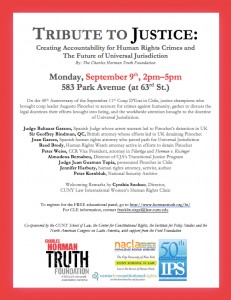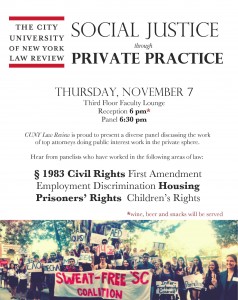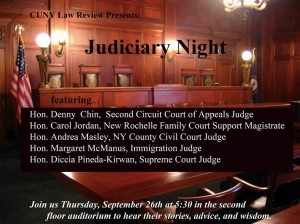Author Archives: CUNY Law Review
EVENT: Thurs., 11/7: Social Justice Through Private Practice*
Panel will feature the following guests, who bring experience in diverse areas of the law such as tenants’ rights, labor and employment, First Amendment, prisoners’ rights, civil rights, police brutality, and government misconduct:
- Daniel Alterman (Alterman & Boop LLP)
- Eric Hecker (Cuti Hecker Wang LLP)
- Margaret Sandercock (Goodfarb & Sandercock LLP)
- Naomi Sunshine (Outten Golden)
- Roger Wareham (human rights attorney)
Join us in the 3rd floor Faculty Lounge at 6 p.m. for a food and wine reception. Panel will begin at 6:30 p.m.
*please note the name change
Call for Submissions
The City University of New York Law Review is seeking submissions for its Summer 2014 issue, which will continue the journal’s tradition of advancing legal scholarship highlighting the touchstones of our publication’s work—including civil rights, progressive legal reform, the impact of the law on minorities and marginalized communities, international human rights, and attorneys’ insights on how recent developments in the law have affected their public-interest practices in New York and beyond.
We are interested in one-page abstracts or finished manuscripts you may have for consideration by our editorial board. Submissions should be remitted to cunylr@law.cuny.edu. Abstracts will be considered through December. Finished manuscripts for approved abstracts have a deadline of December 31, 2013. Offers to publish and final decisions on all submissions will be made on a rolling basis and will be finalized by mid-January 2014.
In addition, the journal is seeking shorter, more time-sensitive contributions—such as comments on recent federal or state case law, critiques of legislative proposals, and legally relevant analyses of current events—for inclusion in our evolving digital platform at the City University of New York Law Review website at www.cunylawreview.org. Submissions for digital consideration should be sent directly to our Digital Articles Editor at ldavis@mail.law.cuny.edu.
Our upcoming Winter 2014 issue includes scholarly works on a range of public interest legal issues, with an emphasis on practical application. Some examples include articles about the hurdles of providing on-the-ground legal assistance after natural disasters such as Hurricane Sandy; the impact of family instability on access to education for children with disabilities; gender inequality in granting asylum requests; how language impairments impact attorney-client relationships; applying a human rights framework in determining services for youth aging out of foster care; policy arguments in favor of stronger single-room occupancy regulations aimed at solving the housing crisis in New York City; and applying contract law to strengthen Individual Education Plans.
We look forward to reading and discussing your manuscript for possible publication, and kindly invite you to forward this letter to other social-justice scholars and practitioners who may be interested in publishing with us.
With our warm regards,
Tatenda, Caitlin, Kate & Cristian
On behalf of the City University of New York Law Review Editorial Board
Save the Date: November 7th at 6 pm
CUNY Law Review will be hosting a panel with the theme “How to Keep Your Soul in the For-Profit World” on November 7th in the Faculty Lounge. Reception at 6 pm, Panel at 6:30 pm.
Details to follow.
U.S. v. WINDSOR’S IMPACT ON IMMIGRATION LAW
We are proud to introduce Prof. Janet Calvo’s discussion of the Windsor decision’s impact on immigration law as part of our ongoing series of web-exclusive pieces by professors, students, practitioners, and others who aim to share timely legal commentary in Footnote Forum, the online companion of the Law Review. For more on this opinion, see Prof. Ruthann Robson’s related piece.
Janet M. Calvo*
Click here for a recommended citation and to download a paginated PDF version of this article.
The Defense of Marriage Act (DOMA), barred federal immigration authorities[1] as well as other federal officials from recognizing same-sex marriages. Now that DOMA has been declared unconstitutional in U.S. v. Windsor,[2] the federal officials that implement immigration law have declared that same-sex marriages will be recognized to the same extent as opposite-sex marriages. This has implications for several aspects of immigration law and practice. On July 1, 2013 the Secretary of Homeland Security directed the U.S. Citizenship and Immigration Services (USCIS) “to review immigration visa petitions filed on behalf of a same-sex spouse in the same manner as those filed on behalf of an opposite-sex spouse,”[3] and the USCIS posted additional information about implementation.[4] On August 2, the Secretary of State similarly stated “when same-sex spouses apply for a visa, the Department of State will consider that application in the same manner that it will consider the application of opposite-sex spouses,”[5] and the Department of State website provided further detail, in line with the USCIS position.[6]
Further, on July 17, 2013, the Board of Immigration Appeals (BIA) issued a decision[7] stating that DOMA was no longer an impediment to recognition of same-sex marriages; therefore, a same-sex spouse would be recognized under immigration law if the marriage were valid in the state in which it was celebrated, and was bona fide.[8] This case involved the non-citizen same-sex spouse of a U. S. citizen who had filed a petition on behalf of that spouse. The Director’s determination had found that the marriage was valid under the laws of Vermont where the marriage was celebrated, but did not grant the petition. The BIA held that, after Windsor, the sole remaining issue was whether the marriage was bona fide—i.e., whether the marriage was entered into solely for the purposes of immigration—and remanded the case to allow the Director to make that determination.
Case Comment: United States v. Windsor
We are proud to introduce Prof. Ruthann Robson’s comment on United States v. Windsor as part of our ongoing series of web-exclusive pieces by professors, students, practitioners, and others who aim to share timely legal commentary in Footnote Forum, the online companion of the Law Review. For a discussion of this decision’s impact on immigration law, see Prof. Janet Calvo’s related piece.
Ruthann Robson*
Click here for a recommended citation and to download a paginated PDF version of this article.
A landmark. A victory for “gay rights.” An example of judicial activism.
Each of these appellations is an accurate descriptor of the Court’s decision in United States v. Windsor, rendered on the last day of the 2012–2013 term. By a bare majority, the Court declared Section 3 of the Congressional Defense of Marriage Act (DOMA) prohibiting federal recognition of same-sex marriages unconstitutional. The Court resolved the threshold issue of whether it had Article III power to hear the case, given the unusual posture of the litigation, in favor of rendering a decision, unlike the outcome in the companion case of Perry v. Hollingsworth involving the constitutionality of California’s Proposition 8.[1] The Court’s reasoning included a discussion of Congressional power to pass DOMA, given that marriage and other family matters are generally within the province of the states under federalism as it has developed in the United States. Ultimately, however, the issue was not one of Congressional power. Instead, the majority concluded that DOMA’s Section 3 violated the equal protection component of the Fifth Amendment.
The facts underlying United States v. Windsor have been subject to much media attention. Edith Windsor is a sympathetic and charismatic plaintiff, aged 83 at the time of the decision, whose monetarily specific injury consisted of the $363,053 she paid to the federal government in federal estate taxes because of the non-recognition of her same-sex marriage to her deceased partner, Thea Spyer.[2] The couple had been married in Canada in 2007, and their marriage was recognized by their home state of New York when Thea Syper died in 2009, although New York itself did not itself license same-sex marriages until 2011.[3] Thus, except for the operation of DOMA Section 3, Edith Windsor would have been considered a “spouse” under federal law and entitled to the spousal exemption from estate tax.
EVENT: Judiciary Night
CUNY Law Review invites you to the 2013 Judiciary Night on September 26, 2013 from 5:30 to 9:00 p.m.
The CUNY Law Review Board is orchestrating a diverse panel of judges from New York and will facilitate what we hope will be an engaging dialogue.
The following judges will be in attendance:
Hon. Denny Chin
Judge, Second Circuit Court of Appeals
Hon. Carol Jordan
Support Magistrate, New Rochelle Family Court
Hon. Andrea Masley
Judge, Civil Court of the City of New York
Hon. Margaret McManus
Immigration Judge, EOIR Immigration Court, New York City
Hon. Diccia Pineda-Kirwan
Judge, Supreme Court of the State of New York, Queens County
The panel will be followed by a wine and dinner reception
around 8pm (Vietnamese food with vegetarian, vegan, and
gluten-free options). We hope to see you there!
UPDATE: We are pleased to announce that the event will be
moderated by Prof. Donna Hae Kyun Lee. It will take place
in the auditorium on the second second floor. Directions to CUNY
School of Law can be found here.
Event: Tribute to Justice
 Tribute to Justice:
Tribute to Justice:
Creating Accountability for Human Rights Crimes and The Future of Universal Jurisdiction
By: The Charles Horman Truth Foundation
Monday, September 9th, 2pm–5pm
583 Park Avenue (at 63rd St.)
On the 40th Anniversary of the September 11th Coup D’Etat in Chile, justice champions who brought coup leader Augusto Pinochet to account for crimes against humanity gather to discuss the legal doctrines their efforts brought into being, and the worldwide attention brought to the doctrine of Universal Jurisdiction.
Judge Baltazar Garzon,
Spanish Judge whose arrest warrant led to Pinochet’s detention in UK
Sir Geoffrey Bindman, QC,
British attorney whose efforts led to UK detaining Pinochet
Joan Garces,
Spanish human rights attorney who paved path for Universal Jurisdiction
Reed Brody,
Human Rights Watch attorney active in efforts to detain Pinochet
Peter Weiss,
CCR Vice President, attorney in Filartiga and Horman v. Kissinger
Almudena Bernabeu,
Director of CJA’s Transitional Justice Program
Judge Juan Guzman Tapia,
prosecuted Pinochet in Chile
Jennifer Harbury,
human rights attorney, activist, author
Peter Kornbluh,
National Security Archive
Welcoming Remarks by Cynthia Soohoo, Director,
CUNY Law International Women’s Human Rights Clinic
To register for the FREE educational panel, go to http://www.hormantruth.org/ht/
For CLE information, contact franklin.siegel@law.cuny.edu
Co-sponsored by the CUNY School of Law, the Center for Constitutional Rights, the Institute for Policy Studies and the North American Congress on Latin America, with support from the Ford Foundation
Vol. 16.1: A Celebration OF CUNY School of Law Scholarship
Quote
Explore the digital version of our most recent print edition, Volume 16.1, which celebrates legal scholarship at CUNY School of Law.
Introduction by Andrea McArdle, Professor of Law, faculty advisor to the Law Review, and director of the writing curriculum at the City University of New York School of Law
Remarks
Fixing New York’s Broken Bail System by Justine Olderman, Managing Attorney of the Criminal Defense Practice at Bronx Defenders
Articles
Structured Discrete Task Representation to Bridge the Justice Gap: CUNY Law School’s Launchpad for Justice in Partnership with Courts and Communities by Natalie Gomez-Velez, Professor of Law at City University of New York School of Law
“Hallowed By History, But Not By Reason”: Judge Rakoff’s Critique of the Securities and Exchange Commission’s Consent Judgment Practice by Michael C. Macchiarola, Distinguished Lecturer at City University of New York and Adjunct Professor at City University of New York School of Law
Notes
Wage Theft in New York: The Wage Theft Prevention Act as a Counter to an Endemic Problem by Lauren K. Dasse, Staff Attorney at the Florence Immigrant and Refugee Rights Project, City University of New York School of Law Class of 2012, and Editor-in-Chief of CUNY Law Review 2011–2012
Evaluation as the Proper Function of the Parole Board: An Analysis of New York State’s Proposed Safe Parole Act by Amy Robinson-Oost, City University of New York School of Law Class of 2013, and Managing Editor of CUNY Law Review 2012–2013
Public Interest Practitioner Section (PIPS)
Common Law’s Lawyering Model: Transforming Individual Crises Into Opportunities for Community Organizing by Karen Gargamelli and Jay Kim, City University of New York School of Law Class of 2007 and Common Law co-founders and staff attorneys
Reflections on the history and future of the voting rights act in the wake of Shelby County
We are proud to launch Footnote Forum, CUNY Law Review’s new online companion featuring web-exclusive pieces by professors, students, practitioners, and others who aim to share timely legal commentary. Download the inaugural installation, CUNY Law Professor Frank Deale’s Reflections On the History and Future of the Voting Rights Act In the Wake of Shelby County, or keep reading below.
Frank Deale*
I.
At the conclusion of America’s deadliest military conflict, the United States Congress sought to reconstruct a nation torn apart by civil war by enacting a program of radical social change designed to eliminate the legal disabilities shouldered by the newly freed African-American male population. Included in the numerous proposals was a series of Amendments to the U.S. Constitution: the 13th Amendment would abolish the institution of slavery; the 14th Amendment would provide equal protection and due process under law to those with former slave status; and the 15th Amendment would enable them to protect these rights via a right to vote, unencumbered by “race” or “color” discrimination. The Congress was empowered to enforce this provision with appropriate legislation.
Less than 50 years after the enactment of these historic provisions, a substantial number of African-Americans went to polling stations in the state of Alabama, the home of Shelby County, seeking to register as voters for an upcoming election. In flagrant violation of the language in the Constitution, they were turned away because of their race. Undaunted, over 5,000 of them joined a civil case to enforce the Constitution, which was heard by the Supreme Court of the United States. The Court correctly understood the gist of the plaintiffs’ complaint, which was that “the great mass of the white population intends to keep the blacks from voting.”[1] Yet, notwithstanding the stark nature of the facts, the Court denied relief, concluding that:


